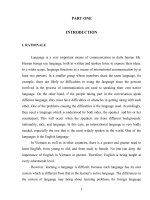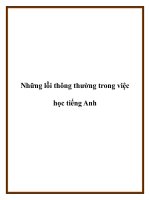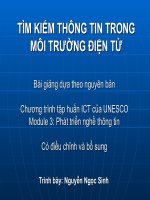Bài giảng nhung loi thong dung trong viec su dung dai tu it
Bạn đang xem bản rút gọn của tài liệu. Xem và tải ngay bản đầy đủ của tài liệu tại đây (70.85 KB, 7 trang )
PART ONE
INTRODUCTION
I. RATIONALE
Language is a very important means of communication in daily human life.
Human beings use language, both in written and spoken form, to express their ideas.
In a wider scope, language functions as a means of international communication by at
least two persons. In a smaller group whose members share the same language, for
example, there are likely no difficulties in using the language since the persons
involved in the process of communication are used to speaking their own native
language. On the other hand, if the people taking part in the conversation speak
different language, they must have difficulties or obstacles in getting along with each
other. One of the problems causing the difficulties is the language used. Accordingly,
they need a language which is understood by both sides, the speaker and his or her
counterpart. This will occur when the speakers are from different backgrounds:
nationality, race, and language. In this case, an international language is very badly
needed, especially the one that is the most widely spoken in the world. One of the
languages is the English language.
In Vietnam as well as in other countries, there is a greater and greater need to
learn English, from young to old, and from male to female. No one can deny the
importance of English in Vietnam at present. Therefore, English is being taught at
every educational level.
However, learning a language is difficult, because each language has its own
system which is different from that in the learner’s native language. The differences in
the system of language may bring about learning problems for foreign language
1
learners. Thus, it is inevitable that in learning English as a foreign language
Vietnamese students usually have problems on account of the differences between
Vietnamese and the target language. It is proved that English grammar is complex and
often causes embarrassment to students. The pronoun “it” is one of the language
categories that students in high schools have to learn much. Due to its various uses, it
is assumed that there are many errors which may be made. In fact, many students
think that the pronoun “it” is easy to learn, so they do not pay much attention on this
category and they often make errors in the use of “it”. For instance:
I hate that you can swim so well and I can not.
It was unexpected their success.
I can not remember it when I last saw her.
Futhermore, as a prospective teacher, I would like to make contribution to the
English teaching in Vietnam. For the reasons above, this study is conducted, which
focuses on errors in the use of “it” among the students in grade 12 at Vu Tien High
School.
II. RESEARCH PRESUPPOSITION
With regard to the errors quoted above, the problem is with grammatical
structures. The correct versions could be:
I hate it that you can swim so well and I can not.
Their success was unexpected.
I can not remember when I last saw her.
Some questions are raised:
1) What kinds of errors are made by the students in grade 12 at Vu Tien High
School in the academic year 2010/2011 ?
2
2) What kind of error in the use of “it” is the most often made by the twelfth-
grade students at Vu Tien High School in the academic year of 2010/2011 ?
3) What are the causes of the errors in the use of “it” made by the students in
grade 12 at Vu Tien High School in the academic year of 2010/2011 ?
Based on the questions above, I am eager to learn about the problems and make
an error analysis in the pronoun “it” so that the major errors in the use of “it” may be
found.
III. RESEARCH OBJECTIVES
The study is aimed at the following goals:
1) To find out the kinds of errors made by the twelfth-grade students at Vu Tien
High School in the academic year of 2010/2011.
2) To find out the main error in the use of “it” most often made by the students in
grade 12 at Vu Tien High School in the academic year of 2010/2011.
3) To find out the causes of the errors in the use of “it” made by the twelfth-grade
students at Vu Tien High School in the academic year of 2010/2011.
IV. RESEARCH SCOPE
The general area of this study is grammar.
The phenomenon is errors in the use of “it” made by the students in grade 12 at
Vu Tien High School in the academic year of 2010/2011. Others relating to the
pronoun “it” are also briefly mentioned.
The population involved in the study is hundred twelfth-grade students at Vu
Tien High School.
3
V.RESEARCH TASKS
The study involves fulfilling the following tasks:
1) To research into the functions and uses of the pronoun “it”.
2) To compare the use of “it”, “one” and “there”.
3) To conduct a survey to find out error types and causes. On the basis of the
findings, possible solutions to the problems are sought to minimize the
students’ errors.
VI. RESEARCH METHODS
To achieve the objectives of the study, the following methods have been
applied:
1) Collecting documents from books listed in the references.
2) Consulting the supervisor, experienced teachers and friends.
3) Synthesizing theoretical documents on English grammar.
4) Conducting a survey and analyzing the results.
VII. SIGNIFICANCE OF THE PROPOSED RESEARCH
Errors in any language teaching and learning, particularly in English as a
foreign language, are sometimes predictable and sometimes unpredictable. It is,
therefore, essential for teachers to have better treatment to anticipate errors. After the
research, it is hoped that the result will helpful to provide:
1) Imput for learners of English in order to minimize their errors in the use of “it”
2) Imput for teachers of English with information on error types and solutions to
the problems so that they can have good methods of teaching the pronoun “it”.
4
This study is also benificial to anyone who is interested in the pronoun “it” in
English.
VIII. DESIGN OF THE RESEARCH WORK
The research work has three main parts, namely: introduction, development,
and conclusion. The part “Development” consists two chapters. Chapter one is entitled
“Theoretical Background”. It consists two sections. Section one reviews literature in
brief. The second one deals with things related to the pronoun “it” such as definition,
functions and uses of “it”. Moreover, the difference between “it” and “there” is also
mentioned.Section one is devoted to the survey. The second deals with error types and
causes. The last one is on solutions to the problems and suggested exercises on the
pronoun “it”.
5









